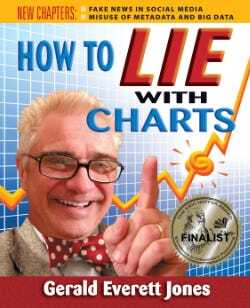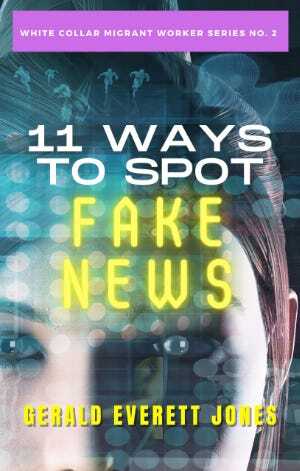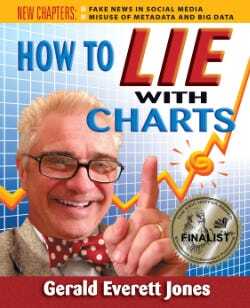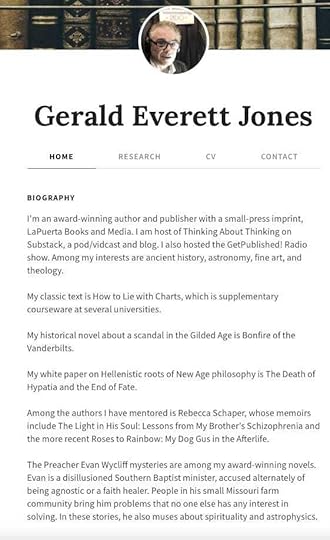Gerald Everett Jones's Blog: Gerald Everett Jones - Author, page 5
April 22, 2025
Trouble in Your Workplace?

Here’s the news release from EIN Presswire:Disruptive Book Counsels Dealing with Trouble in the WorkplaceMartyrs, Victims and Jerks: Dealing with Trouble in the Workplace by Jennifer Thompson was released today in trade paperback, Kindle Print Replica, and Kindle Reflowable formats.
Abused and abusive behaviors not only cause personal stress but also sap the organization's productivity and erodes its positive culture.
Jennifer Thompson brilliantly shepherds us on a workplace safari identifying the Martyrs, Victims and Jerks we encounter in our professional habitats.”
— Giulia Cappelli, author of Find Peace on Purpose
LOS ANGELES, CA, UNITED STATES, April 14, 2025 /EINPresswire.com/ -- Time4Thompson (T4T) Media announces the release of the insightful and provocative business title, Martyrs, Victims and Jerks by Jennifer Thompson. Trade paperbacks will be available from booksellers worldwide, as well as Kindle books from Amazon, on Tuesday, April 22.
In her engaging narrative, professional management consultant Jennifer Thompson takes readers on a literary safari to track down and identify the Big Three bad actors who may be lurking in readers’ office habitats or perhaps even in their own hearts.
Taking a nod from the animal kingdom with the safari theme, Thompson shows how beastly behaviors are preying on the talent and goodwill of the workplace ecosystem - ultimately sucking the joy out of the job:
Martyrs believe no one works as hard as they do. They suffer, and they are proud of their sacrifice. They will remind their teammates how much they are giving to the cause for as long as anyone will listen.
Victims suffer, but they blame others and expect payment in the form of sympathy. The Victim has learned that being perceived as helpless can have great payoffs in the workplace.
Jerks are predators who use a variety of techniques to garner power over their prey. They come in many forms and reside in all levels of an organization.
The narrative is at times whimsical (but always serious), peppered with cartoon renderings of telltale behaviors by illustrator Christopher Zeineh. Thompson provides case studies and assessment questions for readers and their teams, along with effective solutions for making the workplace habitat more cohesive and more productive.
After decades working for larger companies, Thompson decided to connect with global thought leaders and founded Silverstrand Group. As principal of this consulting firm, she developed a life-changing curriculum focused on behavioral change. She explains, “I came to understand that the single, silver strand weaving through all interactions is perception. ‘Linking perception to reality’ is not just a motto but a way of life for me. My personal mission statement is to be a beneficial presence wherever I go. I may fail often, yet I get up every day committed to this vision.”
Thompson’s colleagues have been effusive in their praise for this influential book. Giulia Cappelli, author of Find Peace on Purpose, comments: “Jennifer Thompson brilliantly shepherds us on a workplace safari identifying the Martyrs, Victims and Jerks we encounter in our professional habitats. Through awareness, humor and honesty, we gain the confidence to courageously look in the mirror and make changes for the better, both professionally and personally.”

The book’s safari theme is liberally illustrated with cartoons by Christopher Zeineh. Spotted in the wild (or perhaps in the next cubicle) are the Big Three, shown here from left to right in title-role order.
Gloria Flores, Vice President of Human Resources at a major corporation, says: “Jennifer has worked closely with many areas including the leadership team, sales and marketing, and frontline supervisors. We have seen the impact of Jennifer's strategy of transferring training back on the job. Jennifer takes an upfront and personal approach to her training and coaching. Her passion and caring shine through each and every project she has completed.”
And according to James M. Kaufman, who holds a Ph.D. in Physics from Caltech: “Jennifer Thompson has the qualities of an engineer, scientist, educator, entrepreneur, psychologist, and marriage counselor. This makes her uniquely qualified to delve into the minds of people who call themselves ‘managers.’ Through a variety of case studies, she brings to light their shadows and, more importantly, provides us mere mortals the means to deal with these personalities. On top of that, she's a dog lover, so she must know what she's talking about!”
Thompson plans to continue her consulting engagements for corporate clients as she applies her effective, systematic approach to improving human relations in and among project teams, achieving higher levels of performance and productivity for their organizations.
Learn more about Thompson’s practice, including tutorials, webinars, and consulting engagements at nomvj.com. # # #
Lu Ann Sodano
Publicist
+1 770-356-5030
email us here

Like my time-honored text on data visualization, Thompson’s book is as much a How NOT To…
April 15, 2025
Do I Still Get Excited?
I don’t meditate on my life’s mission anymore, not that I would be limited to where I am today. I wrestled for years in the Hollywood struggle, sending screenplays around town like planes circling the airport but never cleared to land. I worked as a producer of corporate and educational media. I studied screenwriting and directing. I co-wrote books about digital film production in its very early days.
I was jealous of filmmakers in my age group who had been successful. Especially Steven Spielberg, who is a master technician, but I thought his obsessiveness with detail often sapped the emotion from his work.
In a group exercise on a seminar weekend, I was encouraged to project myself forward into the future and drop down into the timeline. I saw myself on the stage of the Directors Guild theater right after a presentation or a screening.
I was dressed in a red velvet dinner jacket.
Steven Spielberg had been in the audience, and he walked up to me. He gripped my hand, smiled, and said, “You know, I really admire your work."
No, I never get tired of seeing what I’ve put out there. And I realize that, as a storyteller, I enjoy more freedom of expression than he does. I can admire his effort and achievement, but I regret my path not at all.

No worries, Mom!
Thinking About Thinking is a reader-supported publication. To receive new posts and support my work, consider becoming a free or paid subscriber.
April 13, 2025
100-Year-Old Family Secrets Hidden

 Why didn’t Cornielius Vanderbilt want anyone to know?
Why didn’t Cornielius Vanderbilt want anyone to know?
April 2, 2025
Very Off Topic (VOT)
Recently, an esteemed subscriber to Thinking About Thinking replied to an e-blast with the cryptic:
VOT?
I had to look it up, as I might with many new -isms in the Urban Dictionary.
Off topic?!I want to resist the tempation to get upset here.
But what about self-expression don’t you understand?
To paraphrase Leslie Gore, “It’s my blog and I’ll cry if I wanna.”
That said, my more considered response would be more to the point (or topic, if you prefer). Much of the time, I’m posting book reviews, mainly about literary fiction. It’s prestige by association, you see.
As the Amazon ads might say, If you like Shakespeare, you may also like Gerald.
Fun fact
Gerald is a Welsh name meaning spear-shaker.
Recent posts were not reviews but musings on topics that at least intrigued me.
The Petrodollar Is More Important Than You Think
and
The reasons for my mind straying in these directions were perhaps not obvious to you, but both of these topics speak to anxieties I’ve written about in my novels.
As to the petrodollar, several of my books, including Rubber Babes, Preacher Fakes a Miracle, and Harry Harambee’s Kenyan Sundowner, have subplots that involve international money laundering. If the petrodollar moves to cryptocurrency, it will be awash among funds generated by the likes of cartels, human traffickers, and arms dealers.
As to whether my Preacher Evan Wycliff mystery novels are Christian fiction, that’s a question I’ve fretted about. It should be apparent that I’m not writing for the blindly faithful. If you think that every word of scripture was dictated literally by the divine, both Evan and I would disagree with you, but our explanations based on historical research would have no effect. If, on the other hand, you occasionally catch yourself looking in the mirror and doubting the immortality of your soul - or whether you have a soul at all - you're somewhere between agnostic and fickle, which is understandable, human, and (I’d say) forgivable.
I asked AI to generate a cartoon illustrating VOT without giving the bot any clues about how to render the concept. Here’s the result. Feel free to comment (no restrictions!) or just discuss over a glass shared among friends.

Creating off-topic may stimulate innovation. You might go where no one else would or could. Rock on and fear not!
March 9, 2025
Murder Mystery and Mayhem Laced with Morality

Links to this episode:

The audiobook of Mick & Moira & Brad: A Romantic Comedy is serialized on the Podcast tab of this blog - available at no extra charge to Paid subscribers.
Thinking About Thinking is a reader-supported publication. To receive new posts and support my work, consider becoming a free or paid subscriber.
March 5, 2025
For Survival and Sustainability
The news these days is all about evil tech. Nasty gossip in social media forces us into mental silos and opposing camps. AI will surely turn on us, and we will no longer be the masters of our fate (if we ever were).
I don’t think so. Here’s how I suggest we reframe our thoughts.What’s going on? Is this the beginning of the end?

Until now, the human race has survived mainly because our species is clever and highly adaptable. It seems as though we have invented tools just when we needed them. Many of these inventions were first used as weapons, but so far their peaceful applications have been lasting and beneficial.
Consider, then, that humans invented the Internet at just the point in our evolutionary progress that we need instantaneous global communication to solve problems on a planetary scale.
You may say, “Ridiculous! Look at the abuses!”
To which I respond, “Have you ever lived with an angry teenager?”
The Internet is young and not yet mature. As children enter their teens, they become hyper-aware of their standing in social groups. They may taunt and tease each other. They may bully or cower. They begin to have strong opinions and give full vent to their emotions.
When they are fearful and feeling vulnerable because they know they lack experience, they may ask their parents for advice. They may then rebuke the giver, insisting no one has the right to order them around.
I believe we can and we will use our planetary consciousness to guide our actions as a community.
Please talk among yourselves!
February 23, 2025
Is This "Christian Fiction?"
I’ve been asked the question by interview hosts, and more than one book publicist has warned me, “It’s a third rail.”
To the extent that Christian fiction is a formal genre, I haven’t read a lot of it. I have a passing familiarity with the Left Behind series, and certainly I’ve seen apocalyptic movies based on the End of Times, such as Megiddo.
My presumption is - and perhaps it’s ill-informed - in the strictest sense, Christian fiction assumes an audience of the faithful. Faith is either a given from the first page, or expected on the last.
Admittedly, the reluctant investigator of my Preacher Evan Wycliff mystery novels is a doubter. But he’s also a believer. It’s just that some days are better for him than others.
Here’s the engine of drama: People in his small farm community bring him problems that no one else has any interest in solving. His curse (or blessing) is an obsessively curious mind. He’s not only asking himself on a daily basis, “Who am I? What am I here for?” but he also sucks up seemingly impossible quests like so much storm debris for his churning wood chipper.
He grew up as a farm boy in the outlying fields and pastures of Appleton City, Missouri. His folks were Southern Baptists, and he was a student minister. It was natural to assume he’d been called to the profession. But when he attended Harvard Divinity on scholarship, he became disillusioned when he learned more about the abuses of Christian history. He dropped out and took up astrophysics at MIT, then dropped out again, having hoped for more certain answers than he got.
Now he’s back in farm country. He will admit he’s a doubter, some days. He thought he’d get by working as a guest preacher, but then when the old pastor retired, everyone expected Evan to step into the full-time role. That was during Covid. When he attended a near-death experience and an unexpected recovery from long-term coma, some folks began to think he could work miracles.
So - Christian fiction? Maybe there should be “Christian fiction - for the rest of us.”

There are always more questions than answers.
Thinking About Thinking is a reader-supported publication. To receive new posts and support my work, consider becoming a free or paid subscriber.
February 20, 2025
The Petrodollar Is More Important Than You Think
Since World War II, with roots extending decades back, the United States has primarily exerted its international influence - not by wars - but by manipulating financial markets.
Prussian General Karl Von Clausewitz stated:
War is the continuation of politics by other means.
(and, I’d say, vice versa)
Presumably, waging competition with money rather than bullets and bombs is kinder and gentler. Certainly, the impacts are less immediately visible.

Credit Canva for generating this cartoon. I was going to edit the text in the speech balloons, then I realized that the dialogue makes no sense to anybody.
In the current world order, use of financial influence to avoid hot war is most obvious in the imposition of economic sanctions. If you follow the headlines, you no doubt know sanctions exist against Russia, Iran, and North Korea - to name the ones we hear the most about. The US hasn’t targeted these countries unilaterally but in concert with economic allies. Undoubtedly, the American influence is the greatest because of the size of its economy.
February 16, 2025
My Audiobook Is a Deep Fake!
Recently, Amazon Kindle Direct Publishing (KDP) advised me that some of my titles were “eligible” for automatic conversion to audio. (Did a robot select them? Some didn’t qualify.) The program was in beta at the time.
I tried the automatic conversion on my short nonfiction essay, “11 Ways to Spot Fake News.” This little book is part of my White Collar Migrant Worker series. These coffee-break-short books offer advice on making a living in the gig economy along with sundry lessons learned from my exceptional career of making mistakes in the business world.
“11 Ways” is excerpted from my cautionary textbook How to Lie with Charts, which is supplementary courseware for some college courses in marketing and financial reporting.
The result sounded surprisingly natural, even friendly. It was somewhat monotone, but sounding less like a mechanical bot than a bored instructor. The process had some bugs, such as when the voice said “dash” instead of taking a brief pause. Such mistakes were rare, though.
It was hardly surprising that rendering illustrations was be problematic. The AI speaker is not programmed to describe the graphics. However, it will read the caption if there is one. A further tip is to tag all images with alternative text, a feature originally intended to aid the visually impaired. The robot will not skip over those.
I also sampled results from converting one of my mystery novels. But dialogue is troublesome, particularly if the author omits attributions, as I often do if the speaker is obvious. Human speakers readily shift their tone of voice or accent to suggest characterization. Our newbie robots don’t.
A few days ago, KDP updated the recording, presumably resolving some of the reported bugs.
For lecture-style presentations, I’d say this process is a quick publishing tool for authors.
As for the audience, those recordings are great if you need the information. But the performance won’t make those lectures any more entertaining.

What do you think? The audiobook is available from Amazon and Audible.

I tried to tell them it’s how NOT to…
February 9, 2025
Meetup on Academia.edu?

I uploaded my research paper Deconstructing the “Scandalous Narrative of the Baptism,” which documents my 20 years of data drilling to uncover the story that inspired my historical novel Bonfire of the Vanderbilts.
That paper and my essay The Death of Hypatia and the End of Fate can be downloaded for free from the site.

Thinking About Thinking is a reader-supported publication. To receive premium content such as podcasts and audiobooks, as well as support my work, consider becoming a free or paid subscriber.



